Best Crypto Wallet in Mexico 2024-2025 for Beginners and Advanced Users
As cryptocurrency continues gaining traction worldwide, many individuals in Mexico seek the best crypto wallet options to manage their digital assets. Whether you’re a beginner or an advanced user, finding a secure and user-friendly wallet is crucial. In this article, we’ll explore cryptocurrency fundamentals, crypto legality in Mexico, the top wallets available for 2024-2025, and why it’s essential to use a wallet instead of relying solely on exchanges.
What is a Cryptocurrency and Crypto Wallet?
Cryptocurrency
Cryptocurrency is a digital or virtual currency that uses cryptography for security. Unlike traditional currencies, such as the Mexican Peso or the US Dollar, cryptocurrencies operate on decentralized networks based on blockchain technology. No central authority, like a bank or government, controls them.
Key Features of Cryptocurrency:
- Decentralization. Cryptocurrencies are not controlled by any government or financial institution, making them immune to manipulation and interference.
- Security. Cryptographic techniques secure transactions and control the creation of new units, providing a high level of security against fraud and counterfeiting.
- Transparency. All transactions are recorded on a blockchain public ledger, allowing anyone to view transaction history while keeping user identities anonymous.
- Limited Supply. Many cryptocurrencies, like Bitcoin, have a capped supply, meaning there will only ever be a certain number of coins created, which can help prevent inflation.
Examples of Popular Cryptocurrencies:
- Bitcoin (BTC). The first and most well-known cryptocurrency was created in 2009. It operates on a decentralized network and is often referred to as “digital gold.”
- Ethereum (ETH). A cryptocurrency that also allows developers to build and deploy decentralized applications (dApps) on its blockchain.
- Ripple (XRP). Designed to facilitate international money transfers, focusing on speed and low transaction costs.
Crypto Wallet
A crypto wallet is a digital tool that allows users to store, send, and receive cryptocurrencies. Think of it as a bank account for your digital assets. However, crypto wallets do not hold the actual currency, unlike traditional bank accounts. Instead, they store the private keys that grant access to your cryptocurrencies on the blockchain.
Types of Crypto Wallets:
- Hot wallets. These are connected to the internet and are more convenient for everyday transactions. Examples include mobile wallets (like Walletverse) and online wallets. However, they are also more vulnerable to hacks.
- Cold wallets. These offline storage options provide higher security for the long-term storage of cryptocurrencies. Examples include hardware wallets (like Trezor and Ledger) and paper wallets. They are less convenient for quick transactions but offer better protection against online threats.
Key Terms Related to Crypto Wallets:
- Private key. A secret number that allows you to access your cryptocurrency. Keeping this safe is crucial; anyone with your private key can control your funds.
- Public key. A cryptographic code that allows users to receive cryptocurrencies. It’s similar to an email address; you can share it with others to receive payments.
- Seed phrase. A series of words can be used to recover your wallet if you lose access. It’s essential to keep this phrase secure and private.
Is Cryptocurrency Legal in Mexico?
Yes, cryptocurrency is legal in Mexico. The country has embraced digital assets, with regulations to ensure consumer protection and anti-money laundering (AML) compliance. The Mexican government recognizes cryptocurrencies as a form of value and has established guidelines for exchanges and wallet providers. This legal framework makes it easier for individuals to invest in and trade cryptocurrencies, contributing to the region’s growing popularity of digital assets.
Top 6 Best Crypto Wallets in Mexico 2024-2025 - Comparison
1. Walletverse
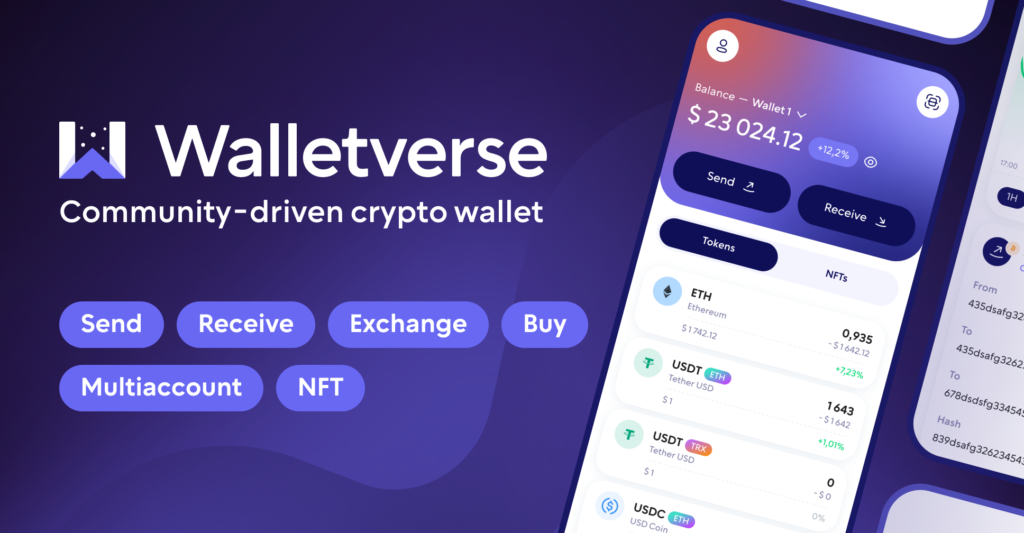
Walletverse is a leading mobile crypto wallet designed for beginners and advanced users. With support for over 600 cryptocurrencies, it offers many features that make it a favorite among Mexican crypto enthusiasts.
Features
Walletverse allows for easy purchasing of crypto through Apple Pay, Google Pay, and credit/debit cards in multiple currencies (USD, KZT, EUR, INR, CAD, AUD, etc.). With pass-code and biometric authentication, users can rest assured that their assets are secure and accessible only to them.
Pros:
- Multi-currency support. Users can manage various cryptocurrencies in one place.
- Fast and secure transactions. Enjoy quick transactions with robust security measures.
- Supports dApps and staking. Access decentralized applications and earn rewards through staking.
- Community-driven and self-custody. Users have complete control over their assets.
Cons:
- Currently only available as a mobile app.
2. Binance Wallet
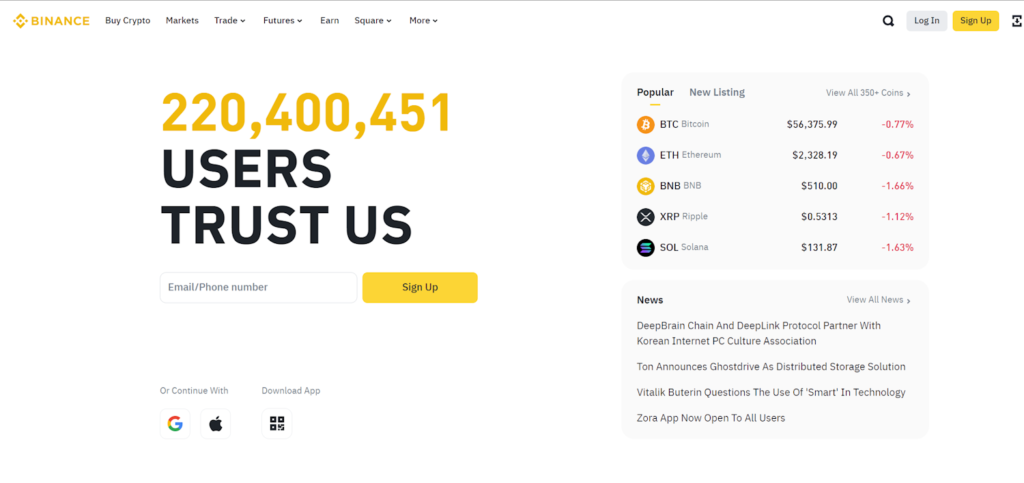
As part of the Binance ecosystem, Binance Wallet is tailored for users who want to engage in trading and investing. It is ideal for advanced users who require a comprehensive suite of tools.
Features
Binance Wallet integrates seamlessly with the Binance exchange, offering advanced trading features, including margin trading and futures. It also includes security measures like two-factor authentication and withdrawal whitelist to protect user funds.
Pros:
- Extensive trading options. Users can access many cryptocurrencies and trading pairs.
- High liquidity. Easy to buy and sell assets quickly.
Cons:
- Complex for beginners. The interface may be overwhelming for cryptocurrency users.
3. Exodus
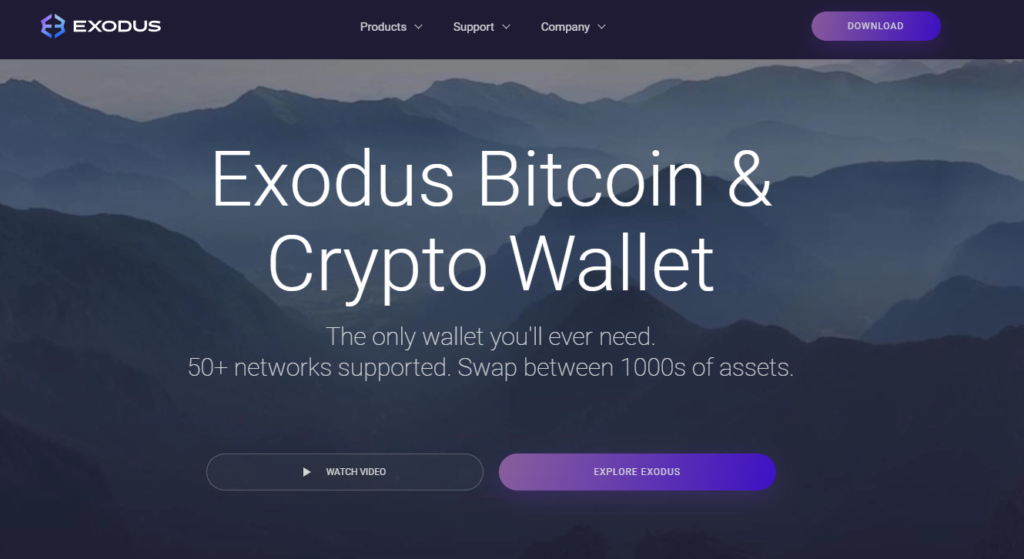
Exodus is a popular desktop and mobile wallet known for its beautiful design and user-friendly interface, making it an excellent choice for beginners.
Features
Exodus supports multiple cryptocurrencies and offers a built-in exchange function, allowing users to manage their assets conveniently. It also provides portfolio tracking and allows users to monitor their investments in real time.
Pros:
- User-friendly interface. Intuitive design makes it easy for newcomers to navigate.
- Built-in exchange feature. Swap cryptocurrencies directly within the wallet without external exchanges.
Cons:
- Limited to desktop and mobile platforms. Not suitable for users looking for a hardware wallet.
4. Coinbase Wallet
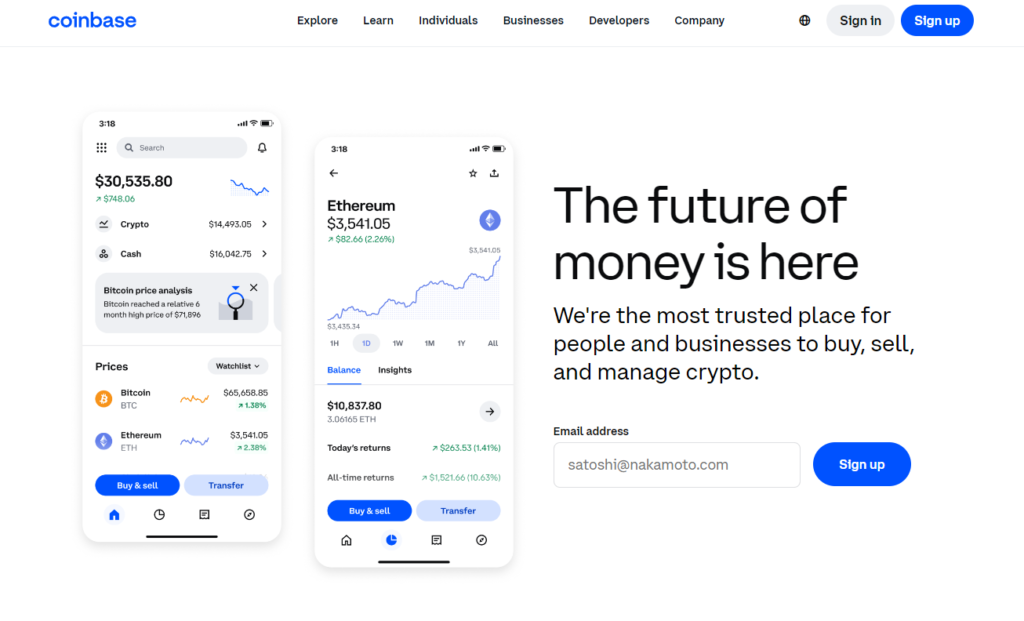
Coinbase Wallet is an extension of the Coinbase exchange, providing a secure way to store and manage cryptocurrencies.
Features
Coinbase Wallet allows users to store cryptocurrencies, decentralized applications (dApps), and NFTs. The wallet is accessible on mobile and offers seamless integration with the Coinbase exchange for easy trading.
Pros:
- Easy to use. Designed with beginners in mind, the setup process is straightforward.
- High security. Coinbase Wallet includes private key control and biometric security features.
Cons:
- Limited cryptocurrency options compared to other wallets. Users may find fewer options for lesser-known coins.
5. Trezor Model T
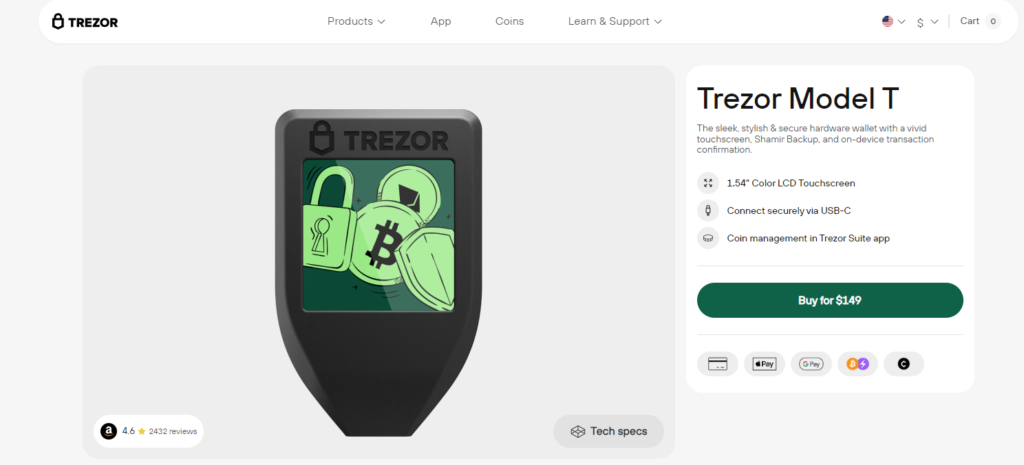
The Trezor Model T is Trezor’s flagship hardware wallet, known for its touch screen and advanced security features.
Features
The Trezor Model T includes features like passphrase entry, two-factor authentication, and a recovery seed for asset recovery. It also supports third-party wallet integrations for added flexibility.
Pros:
- User-friendly touchscreen. Makes navigation easier compared to previous models.
- Supports over 1,800 cryptocurrencies. Offers extensive asset compatibility.
- Open-source. Allows for community audits, enhancing security transparency.
Cons:
- Higher price point. More expensive than the basic models.
- Requires physical access. Less convenient for frequent transactions.
6. Ledger Nano X
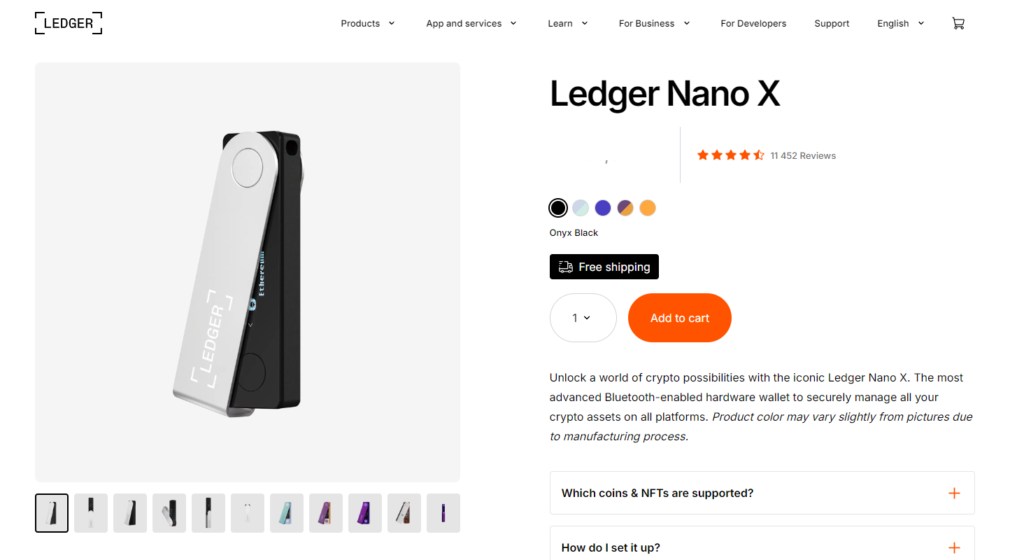
The Ledger Nano X is a highly regarded hardware wallet that combines security and portability.
Features
The Ledger Nano X offers robust security features, including a secure element chip and a recovery phrase. It also integrates with the Ledger Live app for seamless asset management and transaction processing.
Pros:
- Bluetooth connectivity. Allows users to manage their crypto on mobile devices without compromising security.
- Large storage capacity. Can hold up to 100 apps for different cryptocurrencies simultaneously.
- Supports over 1,800 cryptocurrencies. Extensive asset compatibility.
Cons:
- Cost. More expensive than some other wallets on the market.
- Mobile apps can be challenging. Some users report difficulties with the Ledger Live app.
Best 5 Crypto Exchanges in Mexico 2024-2025
When it comes to trading cryptocurrencies, choosing the proper exchange is crucial. Several exchanges have gained popularity in Mexico for their reliability, security, and user-friendly interfaces. Here’s a comparison of some of the best crypto exchanges available:
1. Bitso
Bitso is one of Mexico’s largest and most trusted exchanges, known for its regulatory compliance and user-friendly platform.
- Pros:
- Wide variety of cryptocurrencies. Offers a broad selection, including Bitcoin (BTC), Ethereum (ETH), and various altcoins.
- Secure platform. Employs strong security measures, including two-factor authentication (2FA).
- Local support. Customer service is available in Spanish, catering to the local market.
- Cons:
- Higher fees. Trading fees can be higher compared to some international exchanges.
- Limited advanced trading features. It’s more basic compared to exchanges like Binance.
2. Binance
Binance is a globally recognized exchange that has gained traction in Mexico due to its extensive features and low fees.
- Pros:
- Low trading fees. Competitive fees make it attractive for frequent traders.
- Advanced trading tools. Offers various trading options, including futures and margin trading.
- Wide selection of cryptocurrencies.: Supports thousands of coins and tokens.
- Cons:
- Complex for beginners. The platform may be overwhelming for new users.
- Regulatory scrutiny. Binance has faced regulatory issues in some countries, which may raise user concerns.
3. Coinbase
Coinbase is a user-friendly platform ideal for beginners, providing a simple way to buy, sell, and store cryptocurrencies.
- Pros:
- Intuitive interface. Easy to navigate for newcomers to crypto trading.
- Strong security features. Includes insurance on digital assets stored online.
- Educational resources. Offers tutorials and articles to help users learn about crypto.
- Cons:
- Higher fees. Transaction fees can be significant compared to other exchanges.
- Limited cryptocurrency offerings. It’s not as extensive as other exchanges like Binance.
4. Kraken
Kraken is a well-established exchange that offers a comprehensive range of cryptocurrencies and robust security features.
- Pros:
- Strong security measures. Known for its focus on security and regulatory compliance.
- Advanced trading options. Supports futures trading, margin trading, and staking.
- Low fees for high-volume traders. The fee structure benefits active traders.
- Cons:
- Complex interface. It may be intimidating for beginners.
- Limited customer support options. Users may experience slower response times.
5. LocalBitcoins
LocalBitcoins is a peer-to-peer exchange that allows users to buy and sell Bitcoin directly with each other.
- Pros:
- Variety of payment methods. Supports multiple payment options, including cash and bank transfers.
- Anonymity. Users can trade without the need for extensive verification.
- Flexibility. Users can set their prices and terms.
- Cons:
- Less security. As a peer-to-peer platform, it carries higher risks of fraud.
- Limited customer support. Issues may arise from dealing with individual sellers.
Conclusion
Choosing the right crypto wallet in Mexico is crucial for beginners and advanced users. With options like Walletverse, users can enjoy a seamless experience managing their digital assets while benefiting from high security and support for various cryptocurrencies. Always remember that owning a wallet means you have control over your funds, making it an essential tool in your cryptocurrency journey.
FAQ
Most frequent questions and answers
The best crypto wallet for Mexico largely depends on user needs, but Walletverse is highly recommended for its user-friendly interface, multi-currency support, and robust security features. It caters to beginners and advanced users, allowing seamless management of over 600 cryptocurrencies. Other excellent options include the Trezor Model T for those prioritizing security and the Ledger Nano X for users who want a portable solution with Bluetooth connectivity.
Yes, you can engage in cryptocurrency activities in Mexico. The country has a legal framework that recognizes cryptocurrencies as a form of value. Mexican citizens can buy, sell, and trade cryptocurrencies through exchanges and wallets. Regulatory bodies like the Comisión Nacional Bancaria y de Valores (CNBV) oversee the crypto market, ensuring consumer protection and compliance with anti-money laundering (AML) regulations. Many local exchanges, like Bitso and Binance, facilitate easy access to the crypto market.
To send crypto to Mexico, follow these steps:
- Choose a wallet. Use a wallet like Walletverse, which supports multiple cryptocurrencies.
- Get the recipient’s address. Ask the recipient for their wallet address (ensure it matches the type of cryptocurrency you’re sending).
- Initiate the transfer. Open your wallet, enter the recipient’s address, specify the amount, and confirm the transaction. Be aware of any transaction fees.
- Confirm the transaction. Depending on the network, the transfer may take a few minutes to be processed.
Make sure to use a reliable network and double-check the recipient’s address to avoid errors.
To buy Bitcoin in Mexico:
- Choose an exchange or crypto wallet. Platforms like Bitso, Binance, and Coinbase are popular options. And crypto wallet Walletverse.
- Create an account. Sign up on the chosen exchange and complete identity verification (KYC) as required.
- Deposit funds. Add funds via bank transfer, credit/debit card, or other payment methods.
- Place an order. Navigate to the BTC section, enter the amount you want to buy, and confirm the order.
- Transfer to the wallet. After purchasing, consider transferring your Bitcoin to a secure wallet like Walletverse for better security.
Buying Ethereum in Mexico is similar to buying Bitcoin:
- Select an exchange. Use platforms such as Bitso, Binance, Coinbase or crypto wallet like Walletverse.
- Create and verify your account. Sign up and complete the necessary identity verification.
- Deposit funds. Use your preferred payment method to add funds to your account.
- Purchase ETH. Find the Ethereum trading section, enter the desired amount, and complete the transaction.
- Store securely. After purchasing, transfer your ETH to a wallet like Walletverse for enhanced security and control over your assets.